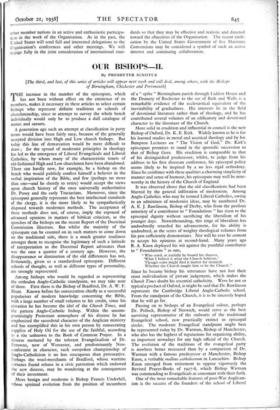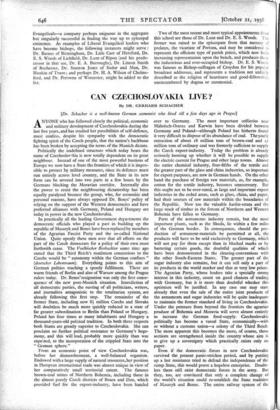OUR BISHOPS-II.
By PRESBYTER IGNOTUS
[The third, and last, of this series of articles will appear next week and will deal, among others, with the Bishops of Birmingham, Chichester and Portsmouth] FIIHE increase in the number of the episcopate, which has not been without effect on the eminence of its members, makes it necessary in these articles to select certain bishops who represent definite traditions or schools of churchmanship, since to attempt to survey the whole bench individually would only be to produce a dull catalogue of names and careers.
A generation ago such an attempt at classification in party terms would have been fairly easy, because of the generally accepted division into High and Low church bishops. But today this line of demarcation would be more difficult to draw ; for the spread of modernist principles in theology has led to the emergence of Liberal Evangelicals and Liberal Catholics, by whom many of the characteristic tenets of old-fashioned High and Low churchmen have been abandoned. There can hardly now, for example, be a bishop on the bench who would publicly confess himself a believer in the verbal inspiration of the Bible, and few (perhaps no more than one—and he shortly to retire) would accept the views upon church history of the once universally authoritative Dr. Pusey and the early Tractarians. Moreover, since the episcopate generally represents the best intellectual standards of the clergy, it is the more likely to be sympathetically disposed towards modernist methods. The acceptance of these methods does not, of course, imply the espousal of advanced opinions in matters of biblical criticism, as the speeches of the bishops on the recent Report of the Doctrinal Commission illustrate. But whilst the majority of the episcopate can be counted on in such matters to come down on the traditional side, there is a much greater readiness amongst them to recognise the legitimacy of such a latitude of interpretation as the Doctrinal Report advocates than was the case a quarter of a century ago. However, the disappearance or diminution of the old differences has not, fortunately, given us a standardised episcopate. Different schools of thought, as well as different types of personality, are strongly represented.
Among bishops who would be regarded as representing the orthodox Anglo-Catholic standpoint, we may take note of three. First there is the Bishop of Bradford, Dr. A. W. F. Blunt. Known before his consecration chiefly as a successful populariser of modern knowledge concerning the. Bible, with a large number of small volumes to his credit, since his elevation he has become the idol of the Church Times, and the pattern Anglo-Catholic bishop. Within the uncom- promisingly Protestant atmosphere of his diocese he has emphasised the sacerdotal character of the Anglican ministry and has exemplified this in his own person by consecrating supplies of Holy Oil for the use of the faithful, according to a rite unknown to the Book of Common Prayer. In a diocese nurtured by the tolerant, Evangelicalism of Dr. Perowne, now of Worcester, and predominantly Non- conformist in character, such outspoken championship of Anglo-Catholicism is no less courageous than provocative. Perhaps the wool-merchants of Bradford, whose wartime fortunes found release in a civic patriotism which endowed the new diocese, may be wondering at the consequences of their investment.
More benign and moderate is Bishop Francis Underhill, whose. spiritual evolution from the position of incumbent of a " spike " Birmingham parish through Liddon House and the Deanery of Rochester to the see of Bath and Wells is a remarkable evidence of the ecclesiastical equivalent of the inevitability of gradualness. His interests lie in the field of devotional literature rather than of theology, and he has contributed several volumes of an edificatory and devotional character to the literature of the Church.
More solid in erudition and influential in council is the new Bishop of Oxford, Dr. K. E. Kirk. Widely known as he is for his learned studies in moral and ascetical theology and by his Bampton Lectures on " The Vision of God," Dr. Kirk's episcopate promises to stand in the apostolic succession to that of Bishop Gore. His erudition is comparable to that of his distinguished predecessor, whilst, to judge from his address to his first diocesan conference, his episcopal policy seems likely to be inspired by a no less rigid orthodoxy. Since he combines with these qualities a charming simplicity of manner and sense of humour, his episcopate may well be note- worthy in the history of the Church of England.
It was observed above that the old classifications had been blurred by the general infiltration of modernism. Among Anglo-Catholics who may be termed Liberal Catholics, owing to an admixture of modernist ideas, may be numbered Dr. A. E. J. Rawlinson, Bishop of Derby, who from the perilous notoriety of a contributor to " Foundations " has risen to the episcopal dignity without sacrificing the liberalism of his younger days. Notwithstanding, this tinge of liberalism has undoubtedly retarded his advancement, for his ability is undoubted, as the series of weighty theological volumes from his pen sufficiently demonstrates. Nor will he ever be content to accept his opinions at second-hand. Many years ago R. A. Knox deployed his wit against the youthful contributor to " Foundations " as one,
"Who cried, as joyfully he bound his sheaves, `What I believe is what the Church believes,' Though some might find it matter for research Whether the Church taught him or he the Church."
Since he became bishop his utterances have not lost their stout individualism of private judgement, which makes the Church Times doubt his essential catholicity. Were he not so typical a product of Oxford, it might be said that Dr. Rawlinson represents the Cambridge Liberal Anglo-Catholic school. From the standpoint of the Church, it is to be sincerely hoped that he will go far.
Passing on to bishops of an Evangelical colour, perhaps Dr. Pollock, Bishop of Norwich, would serve as the best surviving representative of the stalwarts of the traditional Evangelical school, now practically extinct in episcopal circles. The moderate Evangelical standpoint might best be represented today by Dr. Warman, Bishop of Manchester, who also has the highest of reputations for organising ability, so important nowadays for any high official of the Church. The evolution of the traditions of the evangelical party is nowhere better measured than by a comparison of Dr. Warman with a famous predecessor at Manchester, Bishop Knox, a veritable malleus catholicorum in Lancashire. Bishop Knox emerged from retirement to oppose vigorously the Revised Prayer-Books of 1927-8, which Bishop Warman was commending to Evangelicals as consonant with their faith.
One of the most remarkable features of post-War Anglican- ism is the success of the founders of the school of Liberal Evangelicals--a company perhaps exiguous in the aggregate but singularly successful in finding the way up to episcopal eminence. As examples of Liberal Evangelical leaders who have become bishops, the following instances might serve : Dr. Barnes of Birmingham, Dr. Lisle Carr of Hereford, Dr. E. S. Woods of Lichfield, Dr. Lunt of Ripon (and his prede- cessor in that see, Dr. E. A. Burroughs), Dr. Linton Smith of Rochester, Dr. Stanton Jones of Sodor and Man, Dr. Hunkin of Truro ; and perhaps Dr. H. A. Wilson of Chelms- ford, and Dr. Perowne of Worcester, might be added to the list. Two of the most recent and most typical appointments from this school are those of Dr. Lunt and Dr. E. S. Woods. The former was raised to the episcopate from that nursery of prelates, the vicariate of Portsea, and may be considered to represent the efficient type of parish priest, which now finds increasing representation upon the bench, and produces there the industrious and ever-occupied bishop. Dr. E. S. Woods was famous as Bishop-suffragan of Croydon for his popular broadcast addresses, and represents a tradition not unfairly described as the religion of heartiness and good-fellowship, unencumbered by dogma or ceremonial.
















































 Previous page
Previous page